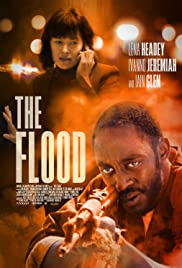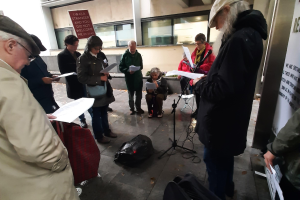Film: The Flood

I was flicking through TV movies for a diversion on a cold evening and 'The Flood' caught my eye. I had no idea what it was about, but two leading characters in 'Game of Thrones' were in it and I clicked to find out more. Bizarrely, here they are immigration officers. How intriguing to see Queen Cersei Lannister (Lena Headey) and Ser Jorah Mormont (Iain Glen) in a pokey little room interviewing an asylum seeker. And that asylum seeker, Haile, is played with a quiet dignity by Ivanno Jeremiah of 'Humans'.
Once drawn in, I was delighted that they lent their celebrity to a film that brilliantly highlights a key human rights issue of our society: the experience of asylum seekers wishing to apply for sanctuary in the UK. In fact, it draws on a context just as epic as any grand-scale film theme, but, sadly, it will not be a huge draw for everyone. Based on director Anthony Woodley, screenwriter Helen Kingston and producer Luke Healy's experiences of volunteering in the Calais refugee camp, this drama spotlights the casual indignity with which the UK government treats displaced people.
Headey stars as Wendy, an immigration officer with the UK Border and Asylum Unit, who interviews refugees to ascertain whether or not their asylum claims have merit. She is bureaucratic. No matter the painful story she hears, no matter the harrowing details, she sticks to her forms and refuses to openly empathise. But during one interrogation, a refugee from Eritrea, in the Horn of Africa, who smuggled himself into England in the back of a truck, the cracks in her bureaucratic armour start to show. Haile's story gets to her.
Thirty-year-old Haile has had a tortuous journey over many months trying to escape violence and oppression in his country. He was forcibly conscripted into the Eritrean military but was tortured after refusing to commit atrocities. Once escaping, he is a victim of asylum crackdowns in Europe where people seeking asylum tend to be regarded by authorities as quasi criminals or 'scroungers'. Yet, flashbacks to his experience in his own country, with its appalling human rights record, demonstrate why he was so desperate to flee, and also his resilience in trying to build a better life.
We see Haile in a boat full of refugees in the Mediterranean when it springs a leak, and despite the frantic efforts of the passengers to shovel the water out with their hands the boat sinks. The flood of water into the boat informs the film's title but also the popular perception of a "flood" of refugees moving restlessly through Europe, seeking a safe harbour from the persecution, war, and horror in their homelands. Sometimes they are perceived as overwhelming the host countries like a metaphorical flood of people, when in fact more than 85% of refugees live in countries neighbouring their own. But Haile does finally make it to his destination country.
During his time in a refugee camp called 'The Jungle,' in Northern France, he makes contact with a trafficker and takes the tough journey in a lorry to England.
The film demonstrates how migrants hold on to their aspirations despite terrible experiences. The flimsy tents in 'The Jungle' at Calais lack services and are depressing, and we see Haile seeking comfort in prayer at the makeshift church in the camp. We see conditions in detention centres in England, and how cases are objectively reviewed, no matter how traumatised the vulnerable people involved.
Headey executive produced 'The Flood,' and it is clearly an issue important to her. She has long been an advocate for migrants. The film offers a timely reflection on the current refugee crisis and the problems with asylum procedures in Britain. Just last month the Jesuit Refugee Service reported that asylum seekers can be deported without due process, often without fully checking the background context of their stories. Immigration structures are too often bureaucracies that cannot handle subtleties, context, or extenuating circumstances. Haile tries to answer Wendy's questions which expect "Yes" or "No" answers, rather than be given space to tell his whole story. It seems to be overlooked that it is not illegal to seek political asylum. When asked why he shouldn't be immediately returned to his home, Haile tells Wendy he would be killed. "Everyone's got a story," she replies dispassionately. And yet, she develops concern that he should be treated fairly, despite this clashing with the government's crackdown policy which seeks to deport too readily. Common humanity is seen throughout the film in the various relationships shown.
Groups such as Seeking Sanctuary, Care4Calais, People not Walls and various Justice and Peace Commissions have long documented conditions in Northern France and the desperation of refugees seeking asylum in the UK; and also hostility in some quarters. This film provides some complexity behind the perilous journeys, and the lack of respect shown to migrants everywhere. In the lorry to the UK the terrified people hiding in the back are mocked by the lorry driver: "there's a bucket in the corner if you shit yourselves." Haile is told by a people smuggler that at the end of his long journey, "England will not want you".
Images from the film that will stay with me are Haile's threadbare shoes - which are eventually replaced - and his face looking around the beach in Italy and seeing it littered with life jackets, remnants from expeditions in the past. They tell the story of the humanitarian crisis of millions of people on the move in the world today.
Watch the official trailer here: www.imdb.com/video/vi266320921?playlistId=tt5954556&ref_=tt_ov_vi
NOTE: 'The Flood' is being screened again on Wednesday, 20th January on Sky Movies Drama & Romance channel - at 08:40 and 23:45. (Thanks to Phil Kerton for this information.)


















